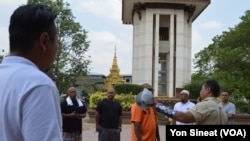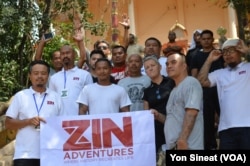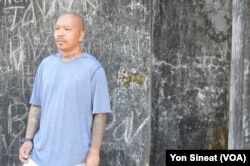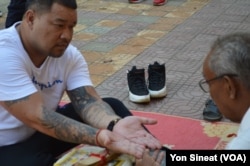On the way to a mountain about 100 kilometers (62 miles) southwest of Cambodia's capital, Phnom Penh, a group of men are getting a crash course in the bloody history of the land to which they've been banished.
The Khmer Rouge atrocities they are learning about crystallize the hell their parents whisked them away from as young children decades ago on their way to refuge in the United States.
Today's students are deportees — the children of Cambodian refugees who got caught up in the U.S. criminal justice system growing up and were deported as a result of felony convictions under a controversial resettlement policy.
Their history teachers — deportees trying to build new futures for themselves — say their class for the weekend trip is enlightened by the experience.
"Actually, when I explain what happened ... their eyes just open up and their mouth — they're like, 'Wow I never knew that,'" said Jimmy Heim, one of the co-founders of Zin, a tour company founded by five deportees in April last year.
On the way to the mountain, they visit Wat Snguon Pich — one of the almost 200 known Khmer Rouge prison camps across Cambodia that were used to exterminate perceived enemies of the regime. Hundreds of people are believed to have been killed at Wat Snguon Pich.
But Heim tells a story of lives spared in the area by a monk who halted fighting by placing himself between government and Khmer Rouge forces fighting in the lead up to the latter group's takeover of the country.
Their next stop is Wat Ampe Phnom — another temple used by the Khmer Rouge as a prison, where Heim says it's estimated more than 4,000 perished.
A lot of it is heavy stuff — extermination camps where thousands were tortured, starved and murdered under the relentless bloodlust of the Khmer Rouge in the 1970s.
Creating jobs
But Zin's tour guides are taking these miserable stories and their own tales of deportation to create something positive — jobs for people who desperately need them.
On this excursion, they are headed to Kirirom National Park, a picturesque mountain in the wilderness that the Khmer Rouge used as a military outpost. In Phnom Penh they also run day tours, introducing tourists to hidden architectural marvels such as the city's old churches and Chinese temples.
Heim, who is part of the 1Love Cambodia deportee support group, says the project, still in its infancy, is building steam in their quest to create 40 jobs for deportees. A deal is in the works with a major tourism firm that sells high-end packages in the thousands of dollars.
For others, it's just about helping them find a sense of belonging in the terrifying new world where they were dropped.
"Most guys here, when they come, they're actually scared, they don't want to go nowhere," Heim said. "They're afraid just to be outside of their housing."
Employment is one of the many hurdles for those trying to help the hundreds of Cambodians who have been returned since 2002.
Though Cambodia's economy has grown rapidly over the past two decades, it remains chronically undiversified and job scarce.
The employment situation is so bad that more than a million people have left in search of work in neighboring countries. Wages for those who stay can start at less than $100 a month.
Psychological hurdles
Criminal backgrounds don't help the deportee job-seekers, nor do the highly prominent tattoos many of them have. They suffer the typical psychological problems of long-term incarceration — depression, anxiety, paranoia and addictive tendencies — only magnified by the knowledge they will likely never see their families on U.S. soil again.
Some speak reasonably good Khmer, though their speech patterns sound clearly foreign to locals — the result of linguistic trends and deviations that have emerged in the strain of the language spoken in the U.S. Their fluency in English is one obvious asset, as is their self-confidence when speaking publicly.
During the tour, Zin performs skills assessments on the 16 new deportees. One of them is 40-year-old Sang Nin, who was deported for a series of offenses he says he committed more than 20 years ago.
"I don't feel any connection with the relatives of my parents and don't know how to find them. Anyway, I hope I can resettle my life in Cambodia by trying to get some work to do for living here," said Nin, who left behind four children in the United States.
At Wat Ampe Phnom pagoda, a fortune teller tells Nin he might be in luck.
"Your past is quite sad, but you going to be better and better from now on," the fortune teller said.
His prophecy is correct. Later that weekend, Nin is hired as one of Zin's newest tour guides.







